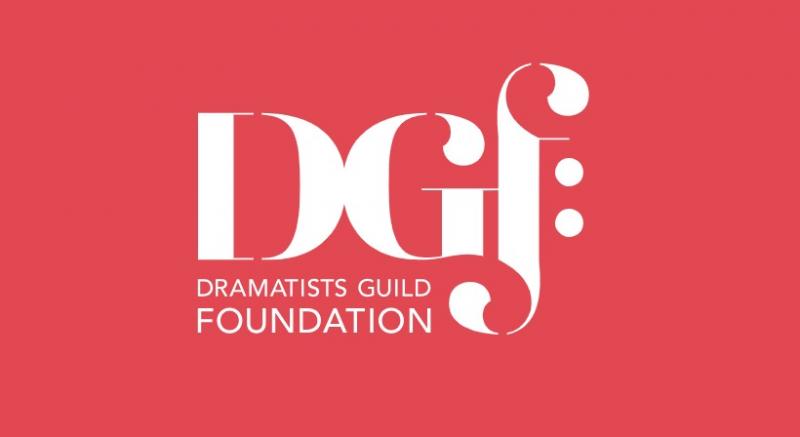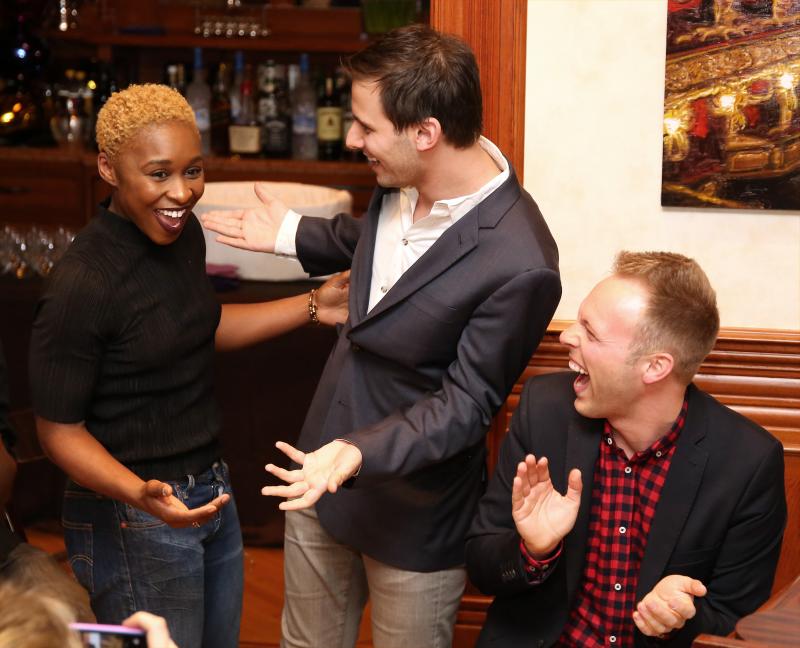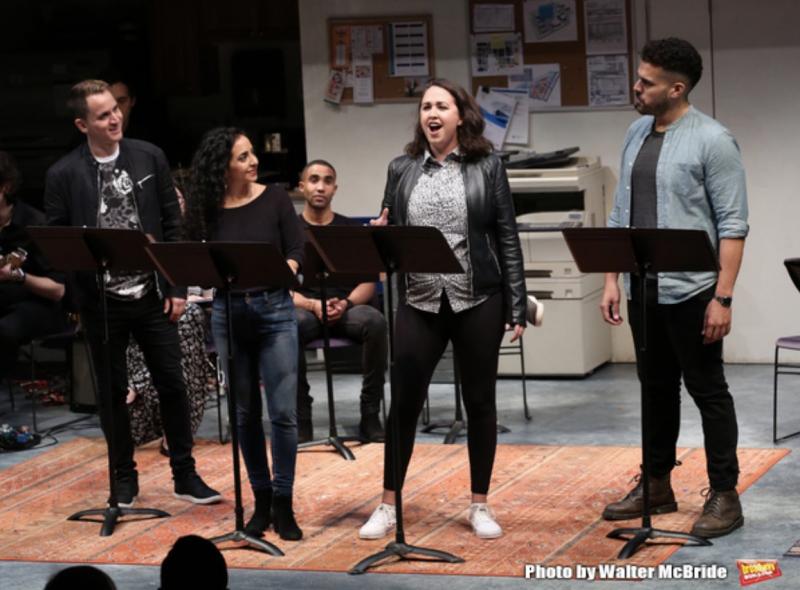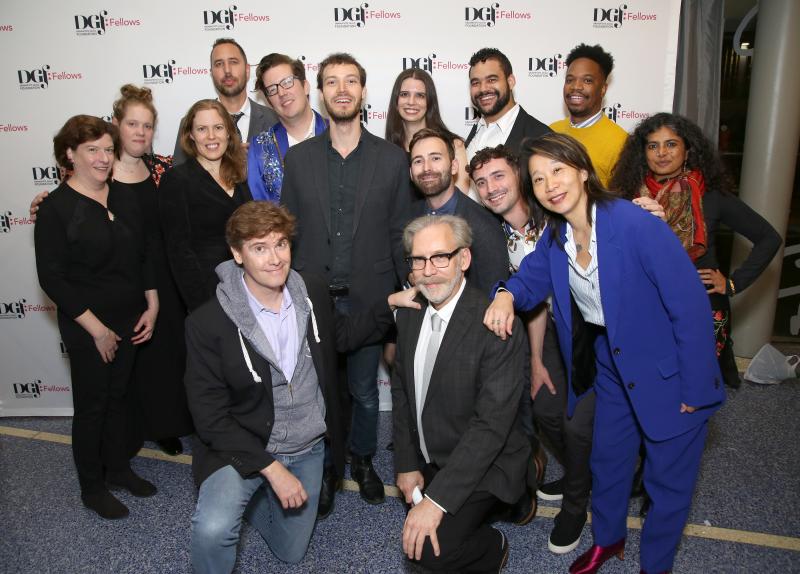Industry Interview: Michael Korie, Laurence O'Keefe, Diana Son & Rachel Routh on the Dramatists Guild Foundation Fellows Program
 The ideas of today's writers become the groundbreaking shows of the future. DGF's Fellows program helps create that future by propelling the most promising creative talents to their full potential.
The ideas of today's writers become the groundbreaking shows of the future. DGF's Fellows program helps create that future by propelling the most promising creative talents to their full potential.
The Fellows program is a selective, year-long intensive for playwrights, composers, lyricists, and bookwriters. The program pairs talented writers with accomplished professional mentors, who help them hone their process, and find their unique voice.
This program increases the likelihood that Fellows will be able to turn their passion and talent into a successful career, In addition, Fellows receive a stipend and the opportunity to partner with several arts organizations and writers colonies for Fellows-specific development opportunities.
Program Chairs Michael Korie, Laurence O'Keefe and Diana Son facilitate the critique sessions and program planning. The Fellows also work with a mentor in one-on-one meetings to discuss the Fellow's ongoing projects and creative concerns.
Below, Korie, O'Keefe, Son and Routh tell us all about how the Fellows program came to be and what the future holds!
Let's start with where it began, it's 18 years old?
Rachel: Yes. Lynn [Ahrens] and Stephen [Flaherty] came up with this concept of putting these musical theater writers with playwrights. The basic premise is that they learn together and respond to one another.
Michael: Right. They meet twice a month and one meeting is devoted to musical theater, and the other one is devoted to playwriting, and each attends the other group's meeting, not to collaborate, just to observe.
Diana: There's up to five playwriting fellows and five musical theater teams chosen from hundreds of applicants, so it's a selective group.
Michael: They meet for a year, and we get guests every single month from all facets of the profession. Whether they are writers from The Dramatist Guild or composers, producers, general managers, orchestrators - the whole. We also find each Fellow or team an individual mentor to meet with.
Once a month the musical theater teams and the playwrights are meeting, and then also once a month everybody's meeting with mentors?
Michael: They meet with an individual mentore once or more, and every month there are one or two guests at the group meetings.
Larry: We've had Adam Guettel recently, Susan Stroman is coming next week, and the Lopez's from Frozen (Kristen was a Fellows alumna) have been back as guests as well.
Diana: The combined group of Fellows meets once a month with me for the playwriting group and once a month with Michael and Larry, so they actually meet twice a month. At every meeting they share new work. When it's the musical theater meeting, the playwrights will chime in and being exposed to that process - the collaborative process, as well as just the really structural way that you guys work, is very illuminating, very beneficial.
How do you choose who is accepted?
Michael: We sit around the table once a year... We read how many applications this year?
Diana: Four hundred.
How do you look at them all?
Michael: They are read by a first panel, which consists of alumni of the Fellows, literary managers, industry professionals, and members of the Dramatist Guild. Then it goes up to a second panel that makes recommendations, and then it comes to us.
The overall viability of the project is the most important factor. Most of the applicants can write songs. Sometimes they are pushing the envelope, sometimes not. But we don't just pick excellent songwriters with questionable books - then we'd be giving basic lessons in dramaturgy for the whole year for unworkable projects.
This is designed to be a program for writers people who have had some experience, whether they went through a college program, the BMI workshop, the NYU program, or had an actual production of professional workshop of their plays or musicals. We aim to give them whatever they need, figuring out what areas of their projects need the most concentration. Many of the younger ones, don't really have a realistic conception of how musicals actually get produced. They come in with -
Larry: Some of the older ones too. It's the industry.
Michael: Right. We get an idea for a musical like "India's Fight for Independence" with 50 cast members and our first questions are "Where is this going to get done?" "Oh, a regional theater," comes the answer "Okay, which one?" we reply.
Are they applying with - here's everything I've ever written, or this is this one thing I'm working on?
Larry: We've had to clarify, gradually over the years, " We need you to apply with one project that has a reasonable level of completion and has a reasonable level of viability."Sometimes they say, "This is my best thing." But no, we're not working on that this year.
Michael: Just like Michael R. Jackson who's having his show produced at Playwrights Horizons later this season. Two years ago he applied with the play that he's getting produced, A Strange Loop. But when he came to the meetings, he wanted to work on a different idea.
Larry: He had the basic outline and a couple of songs, but that was not what he had applied with. So, it was a surprise, but it was easy to pivot, because it was funny and he's such a good writer.
Diana: With playwriting, it's different. They submit a 20-page sample, an excerpt from their plays. It can be the first 20 pages, sometimes it's the most exciting 20 pages. To me, the form of the play is as much of the creation. I'm reading for voice and content. Everybody brings their bias. Is the story being told? Do I know what the problem of the play is within the first few pages? There are some structural basic things, which is not to say that I won't choose a language-oriented play or something that's not story-driven. I would say that voice, and choice of content, and subject matter are what really jump out to me among the submissions.
Everybody comments on each other's work, and with the musical theatre element - they learn more about the structure.
Michael: I think they get something out of hearing all this crazy stuff about musicals.
Diana: Yeah, 100 percent.
Larry: It's also great to watch a playwright and a musical theater person, "Oh, that is a really cool example of something I don't understand." The musical theater people are saying, "Well, oh!" They get frustrated that the playwright doesn't understand, but invariably at some point, which makes the musical theater person go, "Oh, yeah, I should've fixed that." The outsider perspective is very crucial, and it often teaches us musical theater folks some solutions that we didn't think of, because we are so narrowly focused on what the musical's supposed to do.
Michael: We all really try and learn their shows and plays inside out and I think that's been contributing lately to a kind of phenomenal success record of pieces getting picked up. This is very 'finish the project and get it out there'. Diana, I think you're about to have your first Pulitzer nominee with Antoinette Nwandu, right[MOU1] ?
Diana: Yes. Antoinette developed that play, Pass Over in our program.
Michael: And you have a new writer who's creating a ten-play cycle, three of them are being produced.
Diana: Yes, Erika Dickerson-Despenza. Gabriel Dean had a workshop. Jonathan Payne had a production in the last year. James Tyler. Many have gone on to really have great success.
Michael: We had Max Vernon who did The View Upstairs. We had The Lazour Brothers, Daniel and Patrick, who developed We Live in Cairo which won the Rodgers Award, was workshopped at the O'Neill, and is being produced this season at American Repertory Theater in Cambridge.
Rachel: And The Boy Who Danced On Air, by Tim Rosser and Charlie Sohne which won the Jonathan Larson award and had productions in California and New York.
Michael: Mark Sonnenblick, who just had Midnight at the Never-Get over at The York. Oliver Houser's show XY done at the Kennedy Center and NAMT is going to get picked up...
Larry: And Eighty Sixed by Sam Salmond and Jeremy King.
The Foundation raises money for this program, it costs a lot of money to run. We don't get any, but we figure out ways to spend money, we don't get paid.
Do the participants have a fee?
Michael: No. They get paid. They don't have to pay a fee. They get a stipend.
Larry: The Dramatists Guild Foundation raises money for this program. It costs a lot of money to run. We don't get any - but we figure out ways to spend it.
Rachel: Part of our long-term strategic plan for the Fellows is that we will be able to give them more and more money. It started up at $500 and now we give them $1,000 each year. But like Michael said, all the wonderful writers at this table donate their time to make that possible and to give them this expert instruction.
by Daniel and Patrick Lazour
Rachel: We did a big analysis of other similar programs like BMI Musical Theater Workshop and other training programs in this realm. We found that the really unique aspects are (1) how it was founded, that it's playwrights and musical theater writers and as far as we can tell, there is no other program like that in the country. (2) Another exciting element is these three writers, right here, and the level of the mentors, and the visiting artists. And then the (3) really significant piece is the new component that we started doing in 2013, where after the Fellows program, some of the Fellows would get a development opportunity. As of this year, we are really proud to say that all of the writers in the Fellow's program get a development opportunity after they graduate.
Some of the funds that we're raising go to develop these partnerships with MacDowell, and the Eugene O'Neill Center, and the Playwright Center in Minnesota.
Michael: We've kind of been a little bit under the radar. We do this showcase once a year and basically, I want the producers to come.
And what would you most like them to know?
Michael: I want them to know about our success rate. They are coming, it's growing. But you can't get people to walk across the street in this town. I want them to come.
Diana: The quality of the work is so high. We each get hundreds of applications in each year and we pick five people/teams from each category- five playwrights and five musical theater writers or writing teams.
Are there people that apply here year after year?
Diana: Yes.
Michael: There are, and for some we tell them why they weren't picked. There were some that were "just didn't quite make it", and I went and set up mentors for them anyway.
Diana: Exactly. If I see the same writer a couple years going, I am looking to see over time how are they challenging themselves. How is this year's different from last year's play? "You're writing the same play every year." "Go outside your comfort zone and really challenge yourself."
Michael: We try and get a very balanced roster, because we represent America's writers and we want the full spectrum.
Larry: The lesson I've learned is that there's actually more than one way to do a musical. There's this funnel that heads towards Broadway, and there's a perception that you need a certain kind of show, a certain kind of mechanism, or a certain kind of 'how' to deliver a certain kind of 'what' to Broadway.
Some of it is true, though and I think in the last ten years or so, it's sort of exploded a bit in the number of ways you can do a Broadway show. Even so, within this program, we've seen vastly different styles, vastly different mechanisms, and I'm learning new things all the time.
Michael: Larry is such a breath of musical knowledge. The Fellows sit down, and they play something, and he gets where they're going with it, and makes suggestions like "Have you thought about bringing out this part?"
Larry: Or sometimes they bring in fully synthesized demos. Then you get to talk about things like, "Okay, you have the equivalent of a 100-piece orchestra here, what do you think your regional theater's going to say, when you want that sound?" Then you get to talk about economics, you get to talk about what it costs to have a band, and how many players would be live, and how many would be digital.
Michael: What does an orchestrator do? One of the teams didn't actually know.
Larry: Yeah, there's a lot of self-taught people who are learning by doing. There's a certain amount of learning that everyone has to do in order to get your ideas from your brain, to the page, to one or two players for your reading, and then, hopefully, more for your production.
Michael: Writing musicals and plays, there's so much to be learned that's not written down. It's a kind of an oral tradition of one generation telling the next. We all got that kind of assistance. I was probably in the first or second year of a similar program The Dramatists Guild was doing.
I got to play my musical before Sheldon Harnick and Jerry Bock, and Kander and Ebb, and Sondheim, and Stephen Schwartz, and Gretchen Cryer and Nancy Ford. I mean, it was just awesome. I was 20-something and I went "hmm", but I've always remembered that.
How do you tell this generation not to go "Hmm" with what you are saying?
Michael: Youth always thinks, 'Well, I'm brilliant and they owe it to me.' There's an aspect of that, which is not the worst thing in the theater. You need a little bit of ammunition, a little bit of armor.
Diana: I think with the playwrights, there are Fellows who can talk about self-producing, and just being more empowered. For me, it was you write a play and then you hope to get a phone call. That is something that they really do share with other. I'm just going to throw this up. I'm going to have a reading in my apartment, or something.
Michael: More young people are interested. At the same time, there are fewer opportunities with black box theaters and second stages and those kinds of things. Then there are all these things that I encourage them not to do like ten-minute musicals.
Larry: Song cycles.
Michael: Who does that help? Ten- minutes, it's a gimmick, not a show.
Larry: Theater works USA does amazing shows, which are made up of ten-minute musicals If You Give a Pig a Pancake, A Mouse a Cookie. And some great writers come out of that. I had a great time working with them. They take children's books like "I Want a Hat Back" or "Pirate". They bundle them together in a musical to make 60 minutes and then they send that on the road.

with Cynthia Erivo at a DGF Salon
Michael: Ostensibly, the philosophy behind that is it's good to get your name out there, to get exposed.
Larry: I would recommend a ten-minute musical as a calling card.
Michael: I don't think it's good to get your name out there, necessarily, and do cabarets and do this. I think it's good to get your show done well, and finish your show, and figure out what your artist point of view is, where you belong.
Do you encourage or discourage things like you should have a YouTube channel and you should be on social media?
Michael: They're all doing that. I don't encourage a lot of networking. I know this profession and I know producers like it better if they come to you
Larry: It's hard to say, because one of the things YouTube does best is it puts your personality out there. It doesn't necessarily put your narratives out there, it doesn't necessarily put your stories out there.
Diana: In general, I try to impart to them, "Be an advocate for yourself. You don't have to end up in a shell. Don't be passive. You can make opportunities for yourself.
Michael: When I was starting out, Ed Kleban heard a couple of my crazy songs and took me out for coffee and told me his philosophy: there are two columns in New York Theater - the one column is everyone who has been produced, and the other column is everyone who hasn't been and wants to be produced. Some people at the bottom of the unproduced column think it's lucky if they could scoot into that column, while they're rather low down. He said he thinks it's better to rise to the top of the unproduced column, so everybody knows that you're next.
Larry: I think it's good to establish a person out of town. I was born in New York, but by accident I came back to Broadway by going into a lot of theater in LA. I got to be a frog in that pond, which was a different shape from the pond here. I got some work, I fell in with a tribe, I think that is a very important thing, to find a bunch of people who are willing, in a sense, to produce it with you. I think that something happens if you work with peers rather than top-down the whole time.
Michael: What do you mean by top-down?
Larry: One who is significantly more powerful. Like Joe Iconis who did Be More Chill, he built his own tribe, performers that were brought in that were about the same age as him, who like to work together and throw these weird, fun, fanciful shows together.
Michael: Artist-generated projects.
Larry: Exactly. I would definitely recommend finding a tribe of your peers to collect some sort to put your stuff on. In a sense theatre is certainly a wonderful tribe in that way and I think Fellows members are among the best.
Michael: Great and generous things were done for all of us and by the generation before us, and we're doing, and giving back, and reminding everyone else they need to give back, too.
Larry: Even though there's an age difference and some of these people are extremely young, and we're older than them, we don't have a financial stake in their success. We have an emotional stake in their success, we have every reason to want them to succeed. But we're not making money off of any individual thing, so our decisions like, "Change that line," or "Fix that song," are not based on some sort of worry about what a ticket buying audience will think. It's a nice...
Michael: When the Fellows come in and they get counseled by some of these leading lights, or a producer comes in and talks about their work and could he produce it, and why he couldn't, they get a sense of belonging to the theater community that they wouldn't ordinarily get.
What's the hopeful end result?
Michael: Listen to the work, look at the outline, hear some songs, read some scenes. We'll steer the conversation to, "What's the next step for this? Who should do this? Where should it go?"

Cast of Borders- 2018 Dramatists Guild Foundation Fellows presentation
It's the opportunity for producers to see things at this once-a-year event or are there other ways that they can see stuff as it progresses?
Diana: I have definitely had Director guests come in here. At first, they come in and do a Q & A, but then they stay, and they listen to the work. I have had Directors say to me, "I'd love to be in touch with that playwright."
It's not the intention but - I think the best part is, it happens incidentally. The Directors just come in there to share their knowledge, but then they hear a writer that they really like.
I also want to go back to what I was saying before. For example, I didn't have mentors. I didn't study playwriting and I didn't go to Grad School. I had to make my own way, and I was just waitressing and writing plays in my apartment.
What I love about this program, because we don't have any requirements in terms of master's degree or whatever, is that somebody like me can get picked based on their sample.
We are trying to help the writer develop as a writer, and not just have the writer develop that play.
Larry: I think our focus has been 'Concentrate on one viable project.' Sometimes our writers have changed projects in the middle of the year, because they go, "I'm not feeling this one. Let's do this other project, which we have." We pivot happily to do that, because it almost always is a good decision to go where their hearts want to go.
Diana: By the time we get to the presentation, they've continued to work on their pieces. Sometimes we're as surprised as anybody, the work that they have continued after the Fellowship ends.
I know that the playwrights often stay in touch, and they go to brunch or they go to each other shows as a group. Some of the alumni, they stay in touch with me and we will get together as a group.
What's the elevator pitch to producers as to why they should put next year's event at the top of their calendars?
Michael: Want to win a Pulitzer Prize?
Diana: Get in early. Get in ahead of everybody else.
Larry: Meet the next people who are going to make you rich. We're going to give you really a happy, full, creative life.
Michael: They should just always be in touch with the emerging voices, and not just send their second assistant from the left.
Diana: It's one night, it's under two hours, you get to hear excerpts from ten pieces, and there isn't a weak link. You're going to hear five really strong plays and five really strong musical and theater selections. I'm blown away.
Diana: Yeah, get in early. The proof is in the pudding. They're winning awards, they're getting recognized, and they're getting commissions for other kinds of work.
Michael: This is not a festival, not a music theater festival. This is really the theater community recognizing and growing its own.

2018 Fellows presentation
For further information about the program, please visit their website at www.dgf.org.
Dramatists Guild Foundation (DGF) is a national charity that fuels the future of American theater by supporting the writers who create it. DGF fosters playwrights, composers, lyricists, and bookwriters at all stages of their careers. We sponsor educational programs; provide awards, grants, and stipends; offer free space to create new works; and give emergency aid to writers in need. By supporting and nurturing the creators of today, we protect the stories of tomorrow.

Videos

